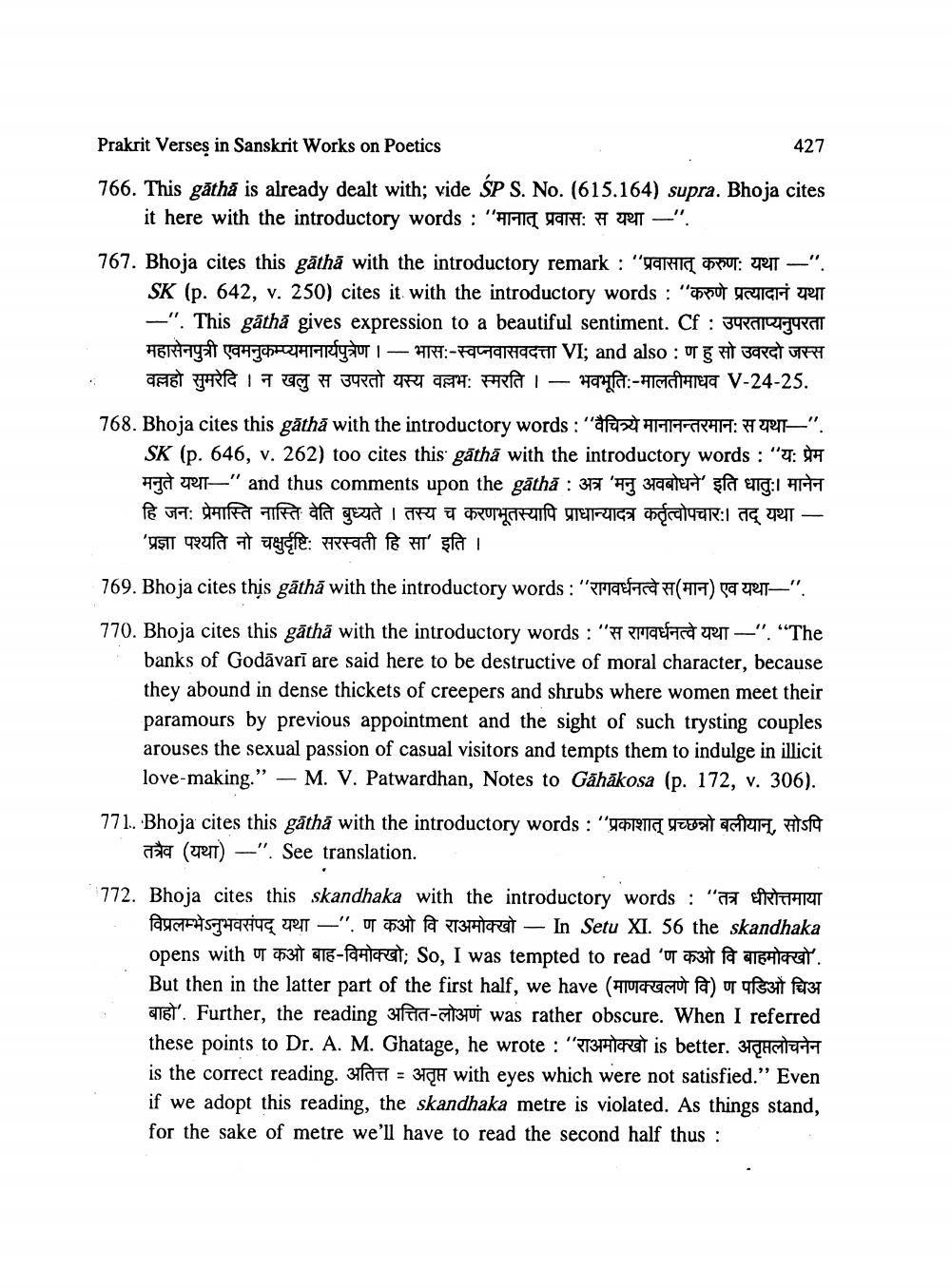________________
Prakrit Verses in Sanskrit Works on Poetics
427
766. This gātha is already dealt with; vide SP S. No. (615.164) supra. Bhoja cites
_it here with the introductory words : "मानात् प्रवास: स यथा -".
767. Bhoja cites this gatha with the introductory remark : "प्रवासात् करुण: यथा-".
SK (p. 642, v. 250) cites it with the introductory words : "करुणे प्रत्यादानं यथा
-". This gatha gives expression to a beautiful sentiment. Cf : उपरताप्यनुपरता महासेनपुत्री एवमनुकम्प्यमानार्यपुत्रेण । -भास:-स्वप्नवासवदत्ता VI; and also : ण हु सो उवरदो जस्स वल्लहो सुमरेदि । न खलु स उपरतो यस्य वल्लभ: स्मरति । - भवभूति:-मालतीमाधव V-24-25.
768. Bhoja cites this gatha with the introductory words : "वैचित्र्ये मानानन्तरमान: स यथा-".
SK (p. 646, v. 262) too cites this gatha with the introductory words : "य: प्रेम मनुते यथा-" and thus comments upon the gatha : अत्र 'मनु अवबोधने' इति धातुः। मानेन हि जन: प्रेमास्ति नास्ति वेति बुध्यते । तस्य च करणभूतस्यापि प्राधान्यादत्र कर्तृत्वोपचार:। तद् यथा'प्रज्ञा पश्यति नो चक्षुर्दष्टि: सरस्वती हि सा' इति ।
769. Bhoja cites this gatha with the introductory words : "रागवर्धनत्वे स(मान) एव यथा-".
770. Bhoja cites this gatha with the introductory words: "स रागवर्धनत्वे यथा-". "The
banks of Godāvarī are said here to be destructive of moral character, because they abound in dense thickets of creepers and shrubs where women meet their paramours by previous appointment and the sight of such trysting couples arouses the sexual passion of casual visitors and tempts them to indulge in illicit love-making." - M. V. Patwardhan, Notes to Gahakosa (p. 172, v. 306).
771. Bhoja cites this gatha with the introductory words : "प्रकाशात् प्रच्छन्नो बलीयान्, सोऽपि
तत्रैव (यथा) -". See translation.
772. Bhoja cites this skandhaka with the introductory words : "तत्र धीरोत्तमाया
विप्रलम्भेऽनुभवसंपद् यथा -". ण कओ वि राअमोक्खो - In Setu XI. 56 the skandhaka opens with ण कओ बाह-विमोक्खो ; So, I was tempted to read ‘ण कओ वि बाहमोक्खो '. But then in the latter part of the first half, we have (माणक्खलणे वि) ण पडिओ चिअ बाहो'. Further, the reading अत्तित-लोअणं was rather obscure. When I referred these points to Dr. A. M. Ghatage, he wrote : "राअमोक्खो is better. अतृप्तलोचनेन is the correct reading. अतित्त = अतृप्त with eyes which were not satisfied." Even if we adopt this reading, the skandhaka metre is violated. As things stand, for the sake of metre we'll have to read the second half thus :




